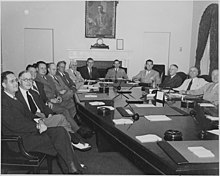
Quick Facts

Biography
Lewis Baxter Schwellenbach (September 20, 1894 – June 10, 1948), was an American lawyer, politician, and judge. He was born in Superior, Wisconsin.
Early life and politics
Schwellenbach was born on September 20, 1894, in Superior, Wisconsin, to Martha (née Baxter) and Francis William Schwellenbach. When he was eight years old, his family moved to Spokane, Washington. Later he attended the University of Washington and its law school, where he first became active in politics, becoming a Democrat because (according to Time) he could get in on the ground floor, since the state was full of Republicans. He became a lawyer in 1921, gaining some prominence for his unsuccessful defense in a well-publicized murder case.
He had a practice working with and for labor unions, eventually becoming active in businesses that were owned by the Brotherhood of Locomotive Engineers. He was a director of the Brotherhood Bank and Trust Company. He became the president of Superior Services Laundry Inc., which eventually failed. He unsuccessfully ran for governor of Washington in 1932, but he succeeded in winning election to the United States Senate, in 1934. On December 30, 1935, he married Anne Duffy; they had no children.
U.S. Senator from Washington
As a senator, Schwellenbach led the supporters of Franklin D. Roosevelt's New Deal legislation in the senate. He was an ally of senators Sherman Minton of Indiana, Joe Guffey of Pennsylvania, and Harry S. Truman — the future president of the United States — of Missouri. The Senate opposition to the new deal was then led by Huey Long of Louisiana, who tried to organize a filibuster campaign against the New Deal.
Schwellenbach was one of the few national figures to support Truman in his uphill battle against Governor Lloyd C. Stark in Missouri's democratic Senate primary in 1940 for renomination. Truman won by less than 8,000 votes cast.
Federal Judge in State of Washington
While Schwellenbach reportedly wished to be appointed to the Supreme Court, Roosevelt instead appointed him to a federal district court (for the Eastern District of Washington) on May 6, 1940 to fill the vacancy after the retirement of J. Stanley Webster. He was confirmed by the senate the same day and received his official commission on November 20. In 1943, he inadvertently stumbled onto the then-extremely secret Manhattan Project — the development of the atomic bomb — in connection with a large land condemnation transaction for a DuPont processing plant.
From 1944 to 1945 he served as dean of Gonzaga University School of Law.
Secretary of Labor


In 1945, Schwellenbach was named Secretary of Labor, replacing Frances Perkins, by then-President Harry S. Truman, who wanted a more politically aware secretary. He was a more active secretary than his predecessors. He changed the labor department from a department primarily interested in statistical information gathering to a policy-making department, actively trying to conciliate labor with management and promote a high-wage economy based on unionized labor. with the Employment Act of 1946, he codified his policy of promoting maximum employment. He also presided over the end of the wage and price controls which had been in effect during World War II. The Republicans (who had regained control of congress in 1946) were able to pass the Taft-Hartley Act, overriding President Truman's veto, in order to roll back what they saw as the growing power of labor unions. The Federal Mediation and Conciliation Service became an independent part of the federal government, removing that function from the labor department.
Schwellenbach tried to use his judicial temperament to negotiate agreements. At one point during his term, the nation faced a major crisis — large unions in the oil, coal, automobile manufacturing and railroad industries demanded high (30%) wage increases and threatened strikes which could, through secondary effects, cripple the economy. When the oil companies would not agree to Schwellenbach's proposal to negotiate a smaller increase (between 15% and 30%), the federal government seized the oil refineries. He and Truman continued to try to get their political allies who headed unions to compromise. The government was finally able to avert a strike when Truman signed orders seizing the railroads in the presence of the union leaders.
On June 10, 1948, Lewis Schwellenbach died suddenly at the Walter Reed Army Medical Center, in Washington D.C., at the age of 53. He is buried in Washelli Cemetery in Seattle, Washington.
